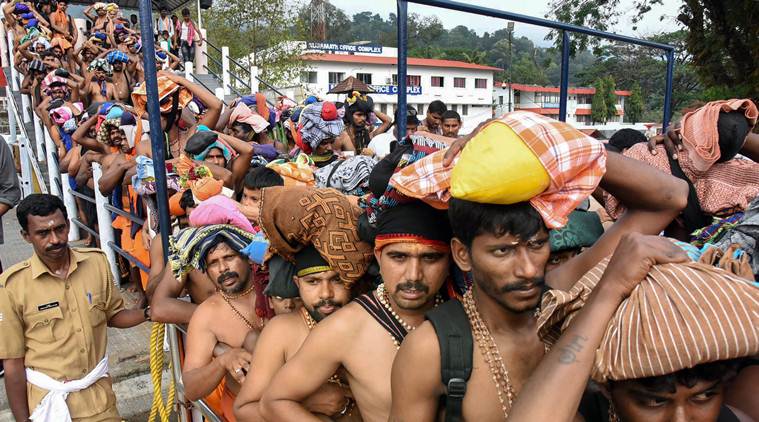M for menstruation
Menstrual politics is at the heart of the Sabarimala entry controversy. By a majority 4-1 decision, the Supreme Court ruled that the prohibition of girls and women between the age of 10 and 50 into the Sabarimala temple was unconstitutional.

It needs to be said at the outset, and in the most unequivocal terms, that the still ferocious dispute over the Supreme Court’s September 28 decision which opened the doors of the Sabarimala temple to females between the age of 10 and 50, is fundamentally about the deep and pervasive anxieties among men over menstruation.
By a majority 4-1 decision, the court ruled that the prohibition of girls and women between the age of 10 and 50 into the Sabarimala temple was unconstitutional. Though the Court ordered that the temple be opened to females of menstruating age, protestors blockaded the temple doors and obstructed the implementation of the court order. The SC verdict over the right of women of menstruating age to enter a Hindu temple speaks to problems that afflict women all over the world, but for the present it will suffice to largely confine these remarks to the implications for Indians.
The terms in which the Court’s decision have been debated are clear enough. Those who applaud the decision have described it both as an affirmation of the Indian Constitution’s guarantee of equality between the sexes and as an individual’s right to freedom of worship. Liberals decry the custom which has encroached on the liberty of women as a remnant of an atavistic past, and they salute the Court’s embrace of law as a tool to remedy social injustices. As they point out, though restricting women from entering Sabarimala is generally defended in the name of “centuries-old tradition”, prohibitions on women were first enacted into law as late as in 1965. Indeed, to extend the liberal argument, what is given as a brief on behalf of a timeless custom is nothing more than what historians call “the invention of tradition”. Customs that are often believed to have persisted from “time immemorial” are, in fact, very much a creation of the modern spirit. Some liberals have also argued strongly that construing menstruation as something which is disgusting and polluting is not only indefensible but a sign of ignorance and demeaning to women.
The Court’s critics, on the other hand, argue that women feature prominently among the demonstrators who object to the Court’s decision, and they are, oddly enough, being denied a voice in the matter. Conservatives are firmly of the view that the Court and its secular allies in the media and intellectual class have disdain for Hindu religious customs, and they have put forward the more compelling argument that social change is ineffective and even resented when it is seen as an imposition from above. Matters of religious faith, it is argued, cannot be legislated.







































No hay comentarios:
Publicar un comentario